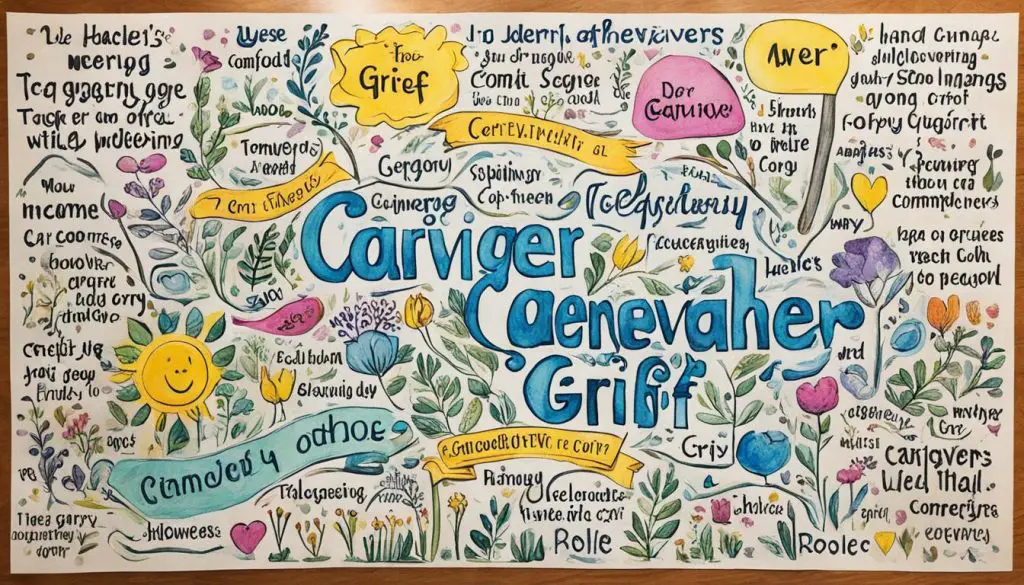As a man who spent a decade loving a woman with endometriosis and fibromyalgia, I have witnessed firsthand the toll that chronic illness can take on both the patient and their caregiver. My wife’s journey with these conditions shaped me into the man I am today, igniting a passion within me to advocate for her and others facing similar challenges. Through my personal blog, I share my knowledge and expertise as a caregiver, providing support and guidance to other men in my position who may be struggling to navigate the complexities of caring for a loved one with chronic illness.
Caregiver grief is a topic that often goes unnoticed, yet it is a significant aspect of the caregiving experience. Acknowledging and understanding the grief experienced by caregivers is crucial for their emotional well-being and ability to cope with the challenges they face. By sharing my own journey and insights, I hope to shed light on the unique grief that caregivers endure, raising awareness and promoting support for those who often feel unseen and unheard.
My blog has not only become a source of information and inspiration for others, but it has also been therapeutic for me personally. Writing about my experiences and sharing my knowledge allows me to process my own emotions and reflect on the lessons I’ve learned along the way. It is a platform where I can connect with others who are going through similar struggles and provide them with the empathy and understanding that I have come to value so deeply.
Through my blog, I aim to break the societal stigmas surrounding caregiver grief and foster a community of support for those in need. Together, we can acknowledge the importance of caregiver grief and provide the validation, empathy, and resources necessary for caregivers to navigate their own journeys of healing and growth.
Understanding the Grief and Bereavement Experiences of Caregivers
Informal caregivers play a crucial role in supporting individuals with chronic illnesses, but this role also comes with its own emotional challenges. Caregivers experience a unique form of grief and bereavement as they navigate the complexities of providing care. Understanding the various dimensions of their grief is pivotal in developing effective interventions and support systems.
When it comes to caregiver grief, there are different types of experiences that can arise. The grief can be influenced by factors such as caregiver burden, demographics, and the specific illness being cared for. Each caregiver’s grief journey is personal and affected by their own unique circumstances. By recognizing and addressing the diverse grief experiences of caregivers, we can develop targeted strategies to provide the support they need.
In order to develop effective interventions and support systems for caregivers, it is important to identify the key mediators of their grief experiences. These mediators can include factors such as social support, coping mechanisms, and access to resources. By understanding these mediators, we can create a comprehensive support network that addresses the specific needs of caregivers.
Types of Grief Experienced by Caregivers
There are different types of grief that caregivers may experience:
- Ambiguous grief: This type of grief occurs when caregivers experience feelings of loss and grief while their loved one is still physically present but mentally absent, such as in cases of dementia. It presents unique challenges as caregivers grapple with conflicting emotions and uncertainty.
- Anticipatory grief: Caregivers often experience anticipatory grief, which is a grieving process that occurs before the actual loss. This allows caregivers to emotionally prepare themselves for the inevitable loss of their loved ones.
- Complicated grief: In some cases, caregivers may experience complicated grief, which is characterized by an extended period of intense and prolonged grieving. This type of grief may require additional support and interventions.
| Grief Type | Description |
|---|---|
| Ambiguous Grief | This type of grief occurs when the caregiver mourns the loss of their loved one’s cognitive presence while still physically present. |
| Anticipatory Grief | Caregivers experience anticipatory grief as they emotionally prepare themselves for the eventual loss of their loved one. |
| Complicated Grief | Caregivers may experience complicated grief characterized by an extended period of intense and prolonged grieving. |
Table: Types of Grief Experienced by Caregivers
The Impact of Chronic Illness on Caregivers’ Grief
Chronic illness can have a profound impact on caregivers, causing them to experience grief and loss long before the actual death of their loved ones. This grief is often intensified when the chronic illness affects cognitive abilities, leading to significant challenges and losses for caregivers.
Caregivers face the loss of control as they witness their loved ones’ declining health and struggle to meet their changing needs. The sense of independence is also lost as caregivers take on more responsibilities and sacrifices for the sake of their loved ones’ well-being. Additionally, the future they had envisioned for themselves and their loved ones may be radically altered, leading to feelings of grief and disappointment.
It is crucial to recognize and validate these losses experienced by caregivers. By acknowledging their grief and providing support, we can help caregivers navigate their emotional journey and find healing amidst the challenges of chronic illness.
The Impact of Chronic Illness on Caregivers’ Grief – Table
| Losses Experienced by Caregivers | Challenges Faced by Caregivers |
|---|---|
| Loss of control | Increased responsibilities |
| Loss of independence | Sacrifices and changes in daily life |
| Changes in future plans | Emotional burden |

The table above illustrates the losses experienced by caregivers and the challenges they face as they provide care for individuals with chronic illness. Recognizing these losses and challenges is essential in supporting caregivers in their grieving process and helping them cope with the emotional impact of caregiving.
Preparing for Anticipatory Grief
As a caregiver of someone with a chronic illness, it’s important to understand the concept of anticipatory grief and proactively prepare yourself for the emotional challenges that lie ahead. Anticipatory grief refers to the mourning process that occurs before the actual loss, allowing caregivers to emotionally prepare for the inevitable.
During this period, it’s crucial to seek support and access available resources to help you cope with your emotions and make necessary preparations. By acknowledging and addressing anticipatory grief, you can navigate the journey ahead with resilience and provide the best possible care for your loved one.
Supportive Strategies for Coping with Anticipatory Grief
Here are some practical strategies to help you prepare and cope with anticipatory grief:
- Education: Educate yourself about the expected progression of your loved one’s illness. Understanding the stages and symptoms can help you anticipate changes and emotionally prepare for them.
- Seek Counseling or Therapy: Consider attending counseling sessions or therapy to help you process your emotions and develop effective coping mechanisms. Professional support can provide valuable guidance during this difficult time.
- Build a Support Network: Reach out to support groups or connect with other caregivers who are going through similar experiences. Sharing your thoughts and feelings with others who understand can provide comfort and validation.
- Self-Care: Prioritize self-care by engaging in activities that bring you joy and relaxation. This may include practicing mindfulness, engaging in hobbies, or spending quality time with friends and family.
- Plan for the Future: Take the time to have conversations with your loved one about their wishes and preferences for medical care, end-of-life decisions, and funeral arrangements. Having these discussions can bring a sense of peace and reduce uncertainty.
Remember, preparing for anticipatory grief is an ongoing process. By proactively implementing these strategies and seeking support, you can navigate the emotional challenges ahead with strength and compassion.
| Key Points: | Benefits: |
|---|---|
| Understanding anticipatory grief | Emotional preparation |
| Seeking support and resources | Coping with emotions |
| Education on the progression of the illness | Empowerment and readiness |
| Therapeutic support | Emotional processing |
| Building a support network | Validation and comfort |
| Prioritizing self-care | Physical and emotional well-being |
| Planning for the future | Reducing uncertainty, peace of mind |
Unique Challenges of Ambiguous Loss
Caregivers of individuals with cognitive impairments, such as dementia, often experience ambiguous loss. This type of loss occurs when the person is physically present but mentally absent. Caregivers may feel frustration, anger, and disappointment when their loved ones have moments of clarity followed by confusion. It is essential for caregivers to acknowledge and process these complex emotions to find comfort and support.
Caregiving for individuals with cognitive impairments can be emotionally challenging. The constant fluctuation between states of mental presence and absence creates a sense of ambiguity and loss for caregivers. They must navigate the unpredictable nature of their loved ones’ cognitive abilities, which can range from moments of lucidity to confusion and disorientation.
This experience of ambiguous loss can be deeply frustrating and distressing for caregivers. They may find it difficult to communicate and connect with their loved ones, leading to a sense of emotional isolation. Caregivers may also struggle with the loss of the shared memories, shared experiences, and the anticipated future that cognitive impairment has disrupted.
Emotional Rollercoaster: Frustration, Anger, and Disappointment
One of the unique challenges of ambiguous loss is the emotional rollercoaster that caregivers often ride. They may feel frustration when their loved ones struggle to recognize them or remember important details. Anger can arise from the constant fluctuations in cognitive abilities, while disappointment may stem from unmet expectations and the loss of a once vibrant relationship.
These complex emotions can be overwhelming for caregivers, making it crucial for them to acknowledge and process their grief. By validating their feelings, caregivers can find solace and seek support to navigate the challenges of ambiguous loss.
Supporting Caregivers in Ambiguous Loss
It is essential to provide caregivers with the necessary resources and support to cope with ambiguous loss. This support can come in various forms, including:
- Education about cognitive impairments and their effects
- Access to support groups where caregivers can connect with others facing similar challenges
- Professional counseling or therapy to process complex emotions
| Support Strategies | Benefits |
|---|---|
| Education about cognitive impairments and their effects | Enables caregivers to understand the causes of ambiguous loss and develop coping strategies |
| Support groups | Provides a sense of community and validation, allows caregivers to share experiences and learn from others |
| Professional counseling or therapy | Offers a safe space for caregivers to process and navigate complex emotions related to ambiguous loss |
By recognizing the unique challenges of ambiguous loss and providing tailored support, caregivers can find comfort, validation, and the resilience needed to navigate their caregiving journey.
The Multiple Dimensions of Grief
Grief is a complex and multifaceted experience that impacts caregivers on various levels. It extends beyond just the emotional realm, affecting caregivers physically, socially, and spiritually. The dimensions of grief are interconnected, intertwining and influencing one another throughout the grieving process. It is important to address and support caregivers in each of these dimensions to ensure their overall well-being and healing.
Emotional Impact of Grief
Grief triggers a wide range of emotions for caregivers. They may feel overwhelming sadness, anger, guilt, and anxiety as they navigate the loss and changes in their lives. It is crucial to acknowledge and validate these emotions, providing a safe space for caregivers to express and process their grief.
Physical Manifestations of Grief
Grief can also manifest in physical symptoms for caregivers. The intense emotions and stress associated with grief can lead to fatigue, headaches, changes in appetite, and a weakened immune system. Taking care of their physical well-being is essential for caregivers to cope with grief effectively.
Social Impact of Grief
Grief can significantly impact a caregiver’s social life. They may experience a sense of isolation or detachment from others, especially if they feel that their grief is not understood or acknowledged. Building a supportive network and connecting with individuals who have experienced similar losses can help caregivers feel less alone in their grief journey.
Spiritual Reflection and Grief
Grief often prompts caregivers to reflect on their spiritual beliefs and seek meaning in their loss. They may question their faith or find solace and strength in their spiritual practices. Addressing the spiritual dimension of grief can provide caregivers with a sense of peace and purpose during a challenging time.
Recognizing the multiple dimensions of grief enables caregivers to acknowledge and navigate the complexities of their emotions, physical well-being, social connections, and spiritual beliefs. By addressing these dimensions, caregivers can find support and healing on their grief journey.
The Complexity of the Grieving Process
Grief is a deeply personal and complex experience that varies from person to person. While there are commonly recognized stages of grief, such as shock, anger, bargaining, depression, and acceptance, it is important to remember that everyone grieves differently. The journey of grief is unique and multifaceted, presenting caregivers with various challenges along the way.
The grieving process can be long-lasting and unpredictable, as individuals navigate their emotions and try to make sense of their loss. It is a rollercoaster of emotions, with highs and lows, and it may take time for caregivers to adjust to their new reality without their loved ones.
During the grieving process, caregivers may experience intense feelings of sadness, emptiness, guilt, and even relief. The emotions can be overwhelming, making it essential for caregivers to seek support and understanding from others who have gone through similar experiences.
Table: Stages of Grief
| Stage | Description |
|---|---|
| Shock | The initial reaction to the loss, often characterized by disbelief and emotional numbness. |
| Anger | Feelings of frustration, resentment, and anger towards oneself, others, or even the deceased. |
| Bargaining | An attempt to negotiate with a higher power or seek alternative possibilities to reverse the loss. |
| Depression | Deep sadness and a sense of hopelessness, often accompanied by withdrawal and feelings of worthlessness. |
| Acceptance | Reaching a state of understanding and acceptance of the loss, allowing for healing and adaptation. |
It is important to recognize that these stages are not linear; they do not necessarily occur in a specific order, and individuals may re-experience certain stages multiple times. Every person’s journey through grief is unique, and it is crucial to provide a supportive and understanding environment for caregivers as they navigate their own personal grief process.
While grief can be profoundly challenging, it can also be an opportunity for growth and self-discovery. By allowing themselves to fully experience and process their emotions, caregivers can find healing and resilience. It is important for caregivers to give themselves permission to grieve, to seek help when needed, and to take the time required to honor their own unique healing process.

The Support Network for Grieving Caregivers
Grieving caregivers require a strong support network to help them navigate the bereavement process. Building a comprehensive support system can provide the necessary emotional and practical support for caregivers to cope with their grief. This network may include various sources of support, such as:
- Family and Friends: Loved ones who can offer a listening ear, empathy, and assistance in daily tasks can provide comfort and validation during this challenging time.
- Support Groups: Joining support groups specifically designed for grieving caregivers can offer a sense of understanding and solace through sharing experiences and coping strategies.
- Therapists and Counselors: Professional therapists or counselors trained in grief support can guide caregivers in processing their emotions, providing coping techniques, and facilitating healing.
- Religious or Spiritual Support: For caregivers who find solace in their religious or spiritual beliefs, engaging with their faith community or seeking guidance from spiritual leaders can offer comfort and a sense of hope.
By creating a robust support network, grieving caregivers can find the understanding, validation, and encouragement they need to navigate their bereavement journey. This support can help prevent complications like prolonged grief or depression, guiding caregivers towards healing and resilience.
| Support Network for Grieving Caregivers | Description |
|---|---|
| Family and Friends | Loved ones who offer empathy, assistance, and a listening ear. |
| Support Groups | Joining groups to share experiences and coping strategies. |
| Therapists and Counselors | Professional support in processing emotions and facilitating healing. |
| Religious or Spiritual Support | Engaging with faith communities or seeking guidance from spiritual leaders. |
Support Network for Grieving Caregivers
Practical Strategies for Coping with Grief
When coping with grief, caregivers can employ various practical strategies to navigate their emotional journey and find healing. These strategies serve as important tools for self-care and building resilience in the face of grief. By incorporating these practices into their daily lives, caregivers can prioritize their own well-being and enhance their coping mechanisms. Here are some effective strategies to consider:
1. Writing in a Journal
Expressing your thoughts and emotions through writing can be a therapeutic outlet for grief. Consider keeping a journal to document your feelings, memories, and reflections. Writing can help you process your grief, gain clarity, and find solace in expressing your innermost thoughts.
2. Practicing Gratitude
Amidst grief, finding gratitude can help shift your focus towards the positive aspects of life. Take time each day to identify and appreciate the things you are grateful for. Cultivating gratitude can bring moments of joy and foster resilience as you navigate the grieving process.
3. Engaging in Relaxation Exercises
Practicing relaxation techniques such as deep breathing, meditation, or gentle yoga can help calm your mind and soothe your emotions. These exercises promote relaxation, reduce stress, and provide a sense of inner peace as you cope with grief.
4. Attending Support Groups
Connecting with others who have experienced similar loss can be immensely comforting and validating. Consider joining a grief support group where you can share your experiences, listen to others, and receive support. Support groups provide a safe space to be heard and understood, fostering healing and resilience.
5. Creating Rituals
Rituals can honor the memory of your loved one and provide a sense of connection. Create personalized rituals that hold meaning for you, such as lighting a candle, visiting a special place, or engaging in a favorite activity of your loved one. These rituals can offer solace and serve as a time for reflection and remembrance.
Remember, self-care is crucial during the grieving process. Take time to prioritize your own well-being, nurture yourself, and practice self-compassion. By implementing practical strategies and self-care routines, caregivers can cope with grief, find healing, and emerge stronger in their caregiving journey.

Recognizing the Individuality of Grief
Each individual’s grief journey is unique, shaped by their relationship with the deceased and their personal experiences. It is important to respect and validate the individuality of grief, allowing caregivers to express their emotions and memories in their own way. By recognizing and honoring the individuality of grief, caregivers can find meaning and healing in their grieving process.
Embracing Personal Experiences
Grief is not a one-size-fits-all experience. Each person’s journey is shaped by their unique circumstances, memories, and emotions. Caregivers should be encouraged to embrace their personal experiences and express themselves in ways that feel authentic to them. Some may find solace in journaling, while others may find comfort in sharing stories and memories with loved ones.
It is essential to create a safe and non-judgmental space for caregivers to navigate their individual grief experiences. By acknowledging their pain and validating their emotions, caregivers can begin their healing process and find support in their unique journey.
The Role of Self-Care
Recognizing the individuality of grief also means acknowledging the importance of self-care for caregivers. Each person copes with grief differently, and taking care of one’s physical, emotional, and mental well-being is crucial during this challenging time.
Encourage caregivers to prioritize self-care activities that resonate with them personally, such as exercise, meditation, or engaging in hobbies. Providing resources and support for self-care can help caregivers navigate their grief journey with resilience and strength.
Supporting Caregivers Along their Journey
Grief is not a linear process, and it can evolve and change over time. To support caregivers in their unique grief journeys, it is important to offer ongoing support and resources.
Establishing support groups specifically designed for caregivers can create a sense of community and understanding. These groups can provide a platform for caregivers to share their experiences, learn from one another, and receive guidance from professionals or grief counselors.
By recognizing the individuality of grief and providing tailored support, caregivers can navigate their grief journey with compassion, resilience, and a renewed sense of hope.
| Supporting the Individuality of Grief | Benefits |
|---|---|
| Validating personal experiences | Emotional healing and a sense of acceptance |
| Prioritizing self-care | Increased resilience and well-being |
| Providing tailored support | Sense of belonging and guidance |
Overcoming Societal Expectations and Stigmas
Societal expectations of grief can often be restrictive, imposing a predefined timeline for individuals to “move on” after experiencing loss. Unfortunately, these societal expectations can add additional emotional distress and pressure on grieving caregivers. It is important for caregivers to overcome these expectations and stigmas surrounding grief, allowing themselves the time and space needed to heal and find meaning in their loss.
Overcoming societal expectations and stigmas surrounding grief requires a shift in perspective and a reevaluation of societal norms. Caregivers must recognize that their grief is valid and deserves to be acknowledged, regardless of any external expectations. By embracing their unique grieving process and allowing themselves to fully experience and express their emotions, caregivers can find empowerment and healing.
It is crucial to foster a supportive environment that validates and respects the grieving process. By educating society about the complexities of grief and the diversity of individual experiences, we can challenge the misconceptions and stereotypes surrounding grief. This will enable caregivers to feel understood, accepted, and supported in their journey towards healing.

The Need for Improved Support Systems
Support for caregivers during times of grief and bereavement is crucial to help them navigate their emotional journey and find healing. However, current support systems often fall short in addressing the specific needs of caregivers. There is a pressing need to enhance these systems and provide comprehensive support.
One important aspect is the provision of accessible and comprehensive bereavement care for caregivers. This includes tailored resources, counseling services, and support groups that specifically address the unique challenges faced by caregivers. By providing caregivers with the tools and guidance they need, they can better cope with their grief and find comfort in knowing they are not alone.
In addition, integrating grief support into palliative care services can significantly improve caregiver support. Palliative care professionals, who are already involved in providing holistic care, can play a crucial role in recognizing and addressing the grief experienced by caregivers. By integrating grief support into their care plans, these professionals can ensure that caregivers receive the necessary emotional support alongside the physical and practical aspects of caregiving.
Furthermore, raising awareness about the emotional needs of caregivers is essential in improving caregiver support. Education initiatives and public campaigns can help debunk stigmas and misconceptions surrounding caregiver grief, promoting understanding and empathy. By fostering a supportive and compassionate society, caregivers can feel validated and understood, reducing the emotional burden they may face.
